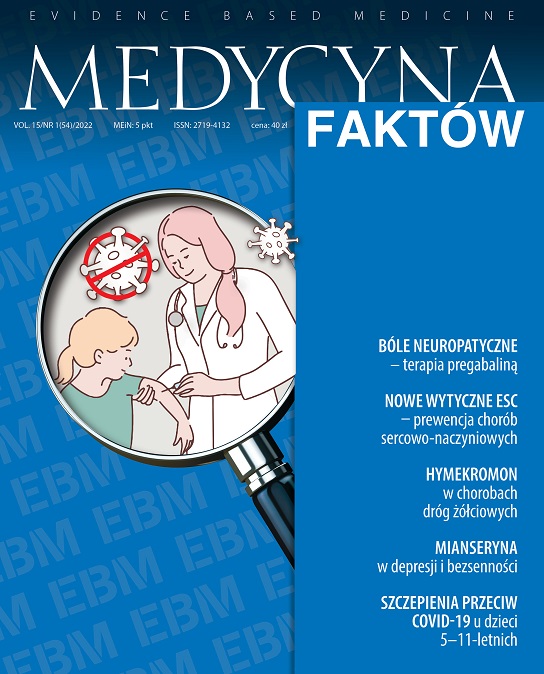Przewód pokarmowy a COVID-19 ze szczególnym uwzględnieniem zaburzeń czynnościowych – obserwacje po 2 latach pandemii Artykuł przeglądowy
##plugins.themes.bootstrap3.article.main##
Abstrakt
Infekcje SARS-CoV-2 często przebiegają z symptomami gastroenterologicznymi, co stanowi duże wyzwanie terapeutyczne. W świetle ponad 2-letnich doświadczeń z pandemią wiadomo również, że po przechorowaniu objawowego COVID-19 i wyeliminowaniu wirusa znacznie wzrasta ryzyko rozwoju zespołu post-COVID, którego dominujący element mogą stanowić zaburzenia czynnościowe przewodu pokarmowego. Obserwuje się także wyraźną tendencję do istotnego zaostrzania symptomów zespołu jelita nadwrażliwego i dyspepsji czynnościowej zdiagnozowanych w okresie przedpandemicznym. Ważny filar opieki nad pacjentami ambulatoryjnymi stanowi telemedycyna zorientowana na rzetelny wywiad z uwzględnieniem ewentualnych objawów alarmujących. W leczeniu zaburzeń czynnościowych przewodu pokarmowego w dobie pandemii zaleca się leki o udowodnionej skuteczności i wysokim profilu bezpieczeństwa, w tym leki spazmolityczne i prokinetyki.
##plugins.themes.bootstrap3.article.details##
Copyright © by Medical Education. All rights reserved.
Bibliografia
2. Boban M. Novel coronavirus disease (COVID-19) update on epidemiology, pathogenicity, clinical course and treatments. Int J Clin Pract. 2021; 75(4): e13868.
3. Ghoshal UC, Ghoshal U, Rahman MM et al. Post-infection functional gastrointestinal disorders following coronavirus disease-19: A case-control study. J Gastroenterol Hepatol. 2021: 10.1111.
4. Kamal M, Abo Omirah M, Hussein A et al. Assessment and characterisation of post-COVID-19 manifestations. Int J Clin Pract. 2021; 75(3): e13746.
5. Radwan K. Zakażenie koronawirusem SARS-CoV-2 (COVID-19) a przewód pokarmowy. Medycyna Faktów. 2020; 1(46): 36-42.
6. Ye Q, Wang B, Zhang T et al. The mechanism and treatment of gastrointestinal symptoms in patients with COVID-19. Am J Physiol Gastrointest Liver Physiol. 2020; 319(2): G245-G52.
7. Hikmet F, Méar L, Edvinsson Å et al. The protein expression profile of ACE2 in human tissues. Mol Syst Biol. 2020; 16: e9610.
8. Hunt RH, East JE, Lanas A et al. COVID-19 and Gastrointestinal Disease: Implications for the Gastroenterologist. Dig Dis. 2021; 39(2): 119-39. http://doi.org/10.1159/000512152.
9. Redd WD, Zhou JC, Hathorn KE et al. Prevalence and characteristics of gastrointestinal symptoms in patients with severe acute respiratory syndrome coronavirus 2 infection in the United States: a multicenter cohort study. Gastroenterology. 2020; 159(2): 765-7.
10. Chen Y, Chen L, Deng Q et al. The presence of SARS-CoV-2 RNA in the feces of COVID-19 patients. J Med Virol. 2020; 92: 833-40.
11. Marasco G, Lenti MV, Cremon C et al. Implications of SARS-CoV-2 infection for neurogastroenterology. Neurogastroenterol Motil. 2021; 33(3): e14104.
12. Settanni CR, Ianiro G, Ponziani FR et al. COVID-19 as a trigger of irritable bowel syndrome: A review of potential mechanisms. World J Gastroenterol. 2021; 27(43): 7433-45.
13. Ghoshal UC. Postinfection Irritable Bowel Syndrome. Gut Liver. 2021. http://doi.org/10.5009/gnl210208. Online ahead of print.
14. Schmulson M, Ghoshal UC, Barbara G. Managing the inevitable surge of post-COVID-19 functional gastrointestinal disorders. Am J Gastroenterol. 2021; 116: 4-7.
15. Barbara G, Grover M, Bercik P et al. Rome Foundation working team report on post-infection irritable bowel syndrome. Gastroenterology. 2019; 156: 46-58.
16. Effenberger M, Grabherr F, Mayr L et al. Faecal calprotectin indicates intestinal inflammation in COVID-19. Gut. 2020; 69: 1543-4.
17. Klem F, Wadhwa A, Prokop LJ et al. Prevalence, risk factors, and outcomes of irritable bowel syndrome after infectious enteritis: a systematic review and meta-analysis. Gastroenterology. 2017; 152: 1042-54.
18. Esposito G, Pesce M, Seguella L et al. Can the enteric nervous system be an alternative entrance door in SARS-CoV2 neuroinvasion? Brain Behav Immun. 2020; 87: 93-4.
19. Bostancıklıoğlu M. Temporal Correlation Between Neurological and Gastrointestinal Symptoms of SARS-CoV-2. Inflamm Bowel Dis. 2020; 26(8): e89-e91.
20. Radwan P, Skrzydło-Radomańska B. Rola mikroflory jelitowej w zdrowiu i chorobie. Gastroenterol Prakt. 2013; 2: 1-11.
21. Vodnar D-C, Mitrea L, Teleky B-E et al. Coronavirus Disease (COVID-19) caused by (SARS-CoV-2) infections: a real challenge for human gut microbiota. Front Cell Infect Microbiol. 2020; 10: 575559.
22. Dhar D, Mohanty A. Gut microbiota and Covid-19 – possible link and implications. Virus Res. 2020; 285: 198018.
23. De Oliveira GLV, Oliveira CNS, Cardoso CRB. Microbiota Modulation of the Gut-Lung Axis in COVID-19. Front Immunol. 2021; 12: 635471.
24. Gubatan J, Zikos T, Bishop ES et al. Gastrointestinal symptoms and healthcare utilization have increased among patients with functional gastrointestinal and motility disorders during the COVID-19 pandemic. Neurogastroenterol Motil. 2021; e14243. http://doi.org/10.1111/nmo.14243.
25. Oliviero G, Ruggiero L, D’Antonio E. Impact of COVID-19 lockdown on symptoms in patients with functional gastrointestinal disorders: Relationship with anxiety and perceived stress. Neurogastroenterol Motil. 2021; 33(5): e14092.
26. Oshima T, Siah KTH, Yoshimoto T et al. Impacts of the COVID-19 pandemic on functional dyspepsia and irritable bowel syndrome: A population-based survey. J Gastroenterol Hepatol. 2021; 36(7): 1820-7.
27. Perisetti A, Goyal H. Successful Distancing: Telemedicine in Gastroenterology and Hepatology During the COVID-19 Pandemic. Dig Dis Sci. 2021; 66(4): 945-53.
28. Yang YJ, Bang CS, Baik GH. Prokinetics for the treatment of functional dyspepsia: Bayesian network meta-analysis. BMC Gastroenterol. 2017; 17(1): 83.
29. Kountouras J, Chatzopoulos D, Zavos C. Efficacy of trimebutine therapy in patients with gastroesophageal reflux disease and irritable bowel syndrome. Hepatogastroenterology. 2002; 49(43): 193-7.
